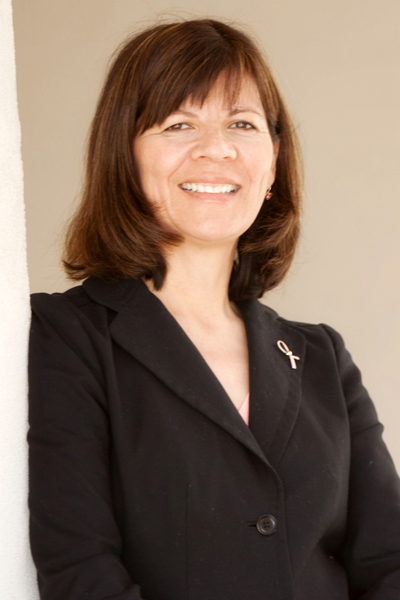
M. Elena Martínez, PhD
M. Elena Martínez, PhD, professor in The University of Arizona’s Mel and Enid Zuckerman College of Public Health and co-leader of the Arizona Cancer Center’s Cancer Prevention and Control program, is a co-author on the outcomes of an H. pylori drug study published in The Lancet.
Read more about the H. pylori study in a story published in the Arizona Cancer Center's 2008 annual report, Journal of Discovery.
A study more than five years in the making finally has the go-ahead to get under way, thanks in large part to funding from the Bill and Melinda Gates Foundation. The study, which was designed by researchers from the Arizona Cancer Center and the Southwest Oncology Group (SWOG), hopes to discover a reliable and widely applicable method for the prevention and gradual reduction of gastric cancer in Latin America
The story began several years ago when leaders of SWOG brainstormed which cancers to target in Latin America for a major prevention study. “One of the cancers that was identified was gastric cancer, or cancer of the stomach,” says Dr. Martínez, who is also co-director of the Cancer Health Disparities Institute.
There are 880,000 cases of gastric cancer a year worldwide, with 650,000 cases resulting in death. Gastric cancer is more common in Latin America than it is in the US because the leading cause of gastric cancer, infection by the stomach bacteria Helicobacter pylori, is significantly more prevalent in developing countries. In developed countries such as the US, gastric cancer cases have been reduced by 90 percent since the early nineteenth century.
A few years ago, representatives from seven countries met in Antigua, Guatemala, to plan the necessary steps for the management of H. pylori in Latin America. The first step is a pilot study to find the best approach for the treatment of the H. pylori infection. Participants from areas in Latin America with high infection rates will be randomly assigned to either a 5- or 14-day treatment course.
“There is currently controversy over the best possible treatment regimen for H. pylori,” says Martínez. “In Latin America, where resources are scarce, we want the shortest possible treatment. Adherence to a treatment regimen is also better if it is shorter. Then again, we want to pick what works, what has the greatest eradication rates.”
The Gates Foundation is providing the funding for the pilot study. SWOG members met in early 2009 to prepare for the study and recruitment for the clinical trial should begin later in the year.
“It is especially gratifying for me and the Arizona Cancer Center to finally receive the funding to get this project started,” says Cancer Center Director David S. Alberts, MD, who has worked on this project from its beginning. “Our Center, working with the Southwest Oncology Group, organized the first conference in Long Beach and second conference in Seattle to address stomach cancer as the second-leading cause of cancer death worldwide.”
A larger study will begin after the pilot study to monitor the affects of the chosen treatment on the incidence of gastric cancer in Latin America








